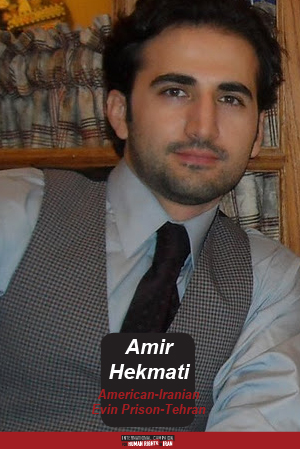One Thousand Days in Prison: John Kerry Appeals for Amir Hekmati’s Release
 The US Secretary of State John Kerry asked the Iranian government, in a statement issued on Memorial Day, May 26, 2014, to release US citizen Amir Mirzaei Hekmati, who has been in prison in Iran since August 2011.
The US Secretary of State John Kerry asked the Iranian government, in a statement issued on Memorial Day, May 26, 2014, to release US citizen Amir Mirzaei Hekmati, who has been in prison in Iran since August 2011.
“Hekmati has spent almost three years in an Iranian prison on false espionage charges,” said Kerry’s statement. Expressing concern about Amir Hekmati’s health, the Secretary of State asked the Iranian government to “release Mr. Hekmati so that he may be reunited with his family in the United States.”
A day earlier, Amir Hekmati’s lawyer, Seyed Mahmoud Alizadeh Tabatabaee, announced that he had appealed Hekmati’s 10-year sentence. “My client believes that this punishment is disproportionate to the crime, and that the Judge has made mistakes in the case; so based on Article 272 of the Criminal Procedure, he has appealed the ruling,” Alizadeh Tabatabaee told ISNA.
In an interview with the International Campaign for Human Rights in Iran, Sara Hekmati, Amir Hekmati’s sister, said that Hekmati’s family is hopeful that 1,000 days after his arrest, he will be pardoned or at least released on bail to be able to see his father who is in the advanced stages of brain cancer and in critical condition in the US.
Amir Mirzaei Hekmati, a United States citizen whose family is from Iran, traveled to Iran for the first time on August 14, 2011, to visit family. He obtained an Iranian passport and permission to enter the country for three months from the Iranian Interests Section in Washington, DC. After two weeks in Iran, Hekmati was arrested and imprisoned in Evin Prison in Tehran, with no explanation to his family.
In January 2012, Iran’s Revolutionary Court sentenced him to death on charges of “cooperating with an enemy state,” “membership in the CIA,” “moharebeh” (enmity with God), and “corruption on earth,” and aired a televised confession in which he claimed to be a CIA spy. His family has consistently held that he went to Iran to visit his grandmother and that he was forced to make false confessions. Televised forced confessions in politically motivated cases are a routine practice in Iran.
After international outcry, in March 2012 Iran’s Supreme Court overturned his death sentence and ordered a retrial. Hekmati was sentenced to ten years in prison in April 2014, a sentence under appeal at this time.
Amir Hekmati spent 16 months in solitary confinement and is now inside Evin Prison’s General Ward.






